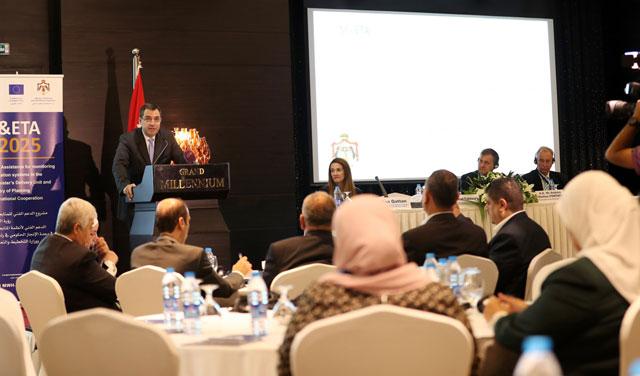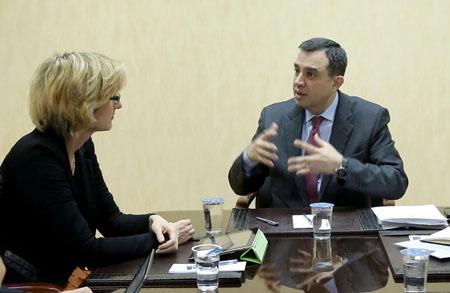You are here
Monitoring and evaluation of government performance vital — Fakhoury
By Rana Husseini - Oct 09,2017 - Last updated at Oct 09,2017

Minister of Planning and International Cooperation Imad Fakhoury speaks during the opening of a three-day workshop titled 'Towards Building Robust Monitoring and Evaluation Systems for Jordan’s National Plans' in Amman on Sunday (Photo courtesy of Planning and Intrnational Cooperation Ministry)
AMMAN — Minister of Planning and International Cooperation Imad Fakhoury on Sunday said it was important to closely monitor the government’s performance and implementation so that “we can depend on ourselves eventually”.
The minister’s remarks were made during the opening of a three-day workshop titled “Towards Building Robust Monitoring and Evaluation Systems for Jordan’s National Plans”.
“We should reactivate the evaluation and monitoring tools of the government and to focus on the implementation side that will help us depend on ourselves, minimise spending and depend more on our own resources,” the minister told representatives and specialists from 36 governmental and non-governmental organisations.
At the same time, Fakhoury added, the monitoring and evaluation process for the national development projects will “help us measure the performance and achieve the goals that was drawn and to have an early chance to amend or redraft the goals and projects in a manner that will help us in the future development planning”.
He added that “we need to adopt such steps because it is a main component of the economic and financial national reform project”.
“It will help us in the long-run by increasing our capital and development expenditure as well as following up on the Jordan Economic Growth Plan 2018-2022.”
The plan, the minister said recently, aims to refocus efforts on the inclusive growth agenda outlining compulsory business reforms, structural and sectoral reforms and much needed capital expenditure programmes that will be implemented by maximising Public-Private Partnerships and private investments.
“This will reflect positively on many government services by expanding the infrastructure, improving the citizens’ standard of living and introducing a variety of resources for power, water, food, as well as improving the quality of education and health and empowering and employing women and the youth,” the minister added.
Fakhoury said it was also “essential to redirect support to Jordanians and control the tax exemptions that non-Jordanians are benefiting from”.
“The challenges that have been imposed on us for the past six years are grave, including the rise of the general debt, the budget deficit and lack of financial resources for the development projects,” Fakhoury added.
In addition, Jordan’s infrastructure and financial resources are facing high pressure “due to the Syrian crisis and the fact that Jordan is a host to 1.3 million refugees who are mostly living in the local communities”.
“These challenges has formulated a boost for Jordan to move forward with its development plans in all its aspects, including turning the challenges into opportunities and improving the standard of living of Jordanians. It is a tough and challenging time for us and we want to come out of it with a Jordanian success story,” Fakhoury stressed.
He also touched on the Jordan Vision 2025, saying it was one of the most notable blueprints to be adopted because it specified “the Jordan that we want in the year 2025 because it includes major wide reforms on the work of the government and the level of development. This is while allowing a wide-range partnership and transparency, which will eventually lead to raising the citizens’ standard of living and parallelly place Jordanian response plans to hold the international community accountable and lobby for additional financial aid to the Kingdom”.
The Jordan Vision 2025 is a 10-year economic blueprint that seeks to achieve a more resilient and prosperous Jordan, focusing on inclusive growth and improving economic competitiveness, investment climate, ease of doing business, self-reliance and entrepreneurship and innovation, based on nine economic clusters.
Also addressing the gathering, EU Ambassador to Jordan Andrea Matteo Fontana stressed the importance of the workshop and its outcome.
“Monitoring and evaluation are very useful tools for ministries, departments and agencies to successfully implement activities within the framework of the government’s overall plans,” Fontana said.
He added that monitoring and evaluation need to be based on sound strategic planning that “identifies the main problems to be addressed and the best way to resolve them within the Jordanian context”.
The EU ambassador said he was hopeful the workshop would conclude with practical outcomes that would equip the participants with “up-to-date knowledge and state-of-the-art monitoring and evaluation tools”.
In addition, the ambassador added that the workshop is expected to provide the participants with the opportunity to “provide their opinions and suggestions on the best ways to build effective public sector monitoring, evaluation and delivery systems”.
The workshop is part of a three-and-a-half year project that is designed to contribute to Jordan’s social and economic growth, through the implementation of the Jordan 2025 vision, the related Executive Development Programme and other relevant plans by assisting the government of Jordan in establishing an effective monitoring and evaluation system to deliver the Kingdom’s future vision, plans and programmes.
The workshop, which was held at the Grand Millennium Hotel, is funded by the EU.
Related Articles
AMMAN — Minister of Planning and International Cooperation Imad Fakhoury on Wednesday attended the ceremony to launch the World Bank’s perio
AMMAN — Minister of Planning and International Cooperation Imad Fakhoury and EU Ambassador to Jordan Andrea Matteo Fontana on Monday signed
Planning Minister Imad Fakhoury on Sunday said donor countries and friendly nations are greatly needed to help Jordan maintain its development achievements.














